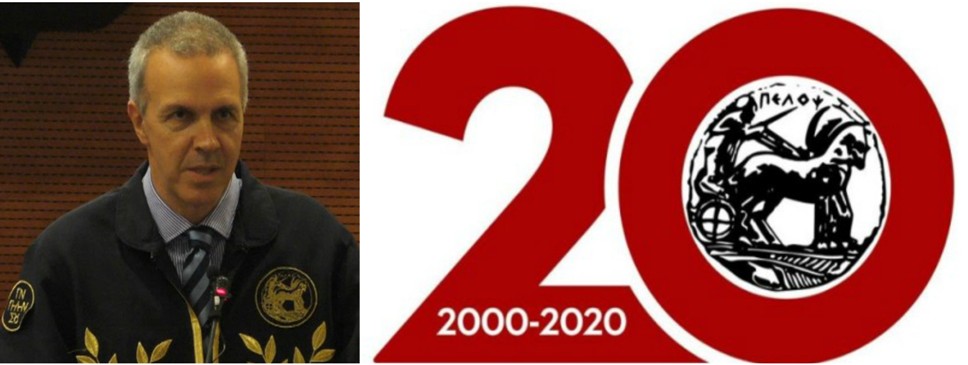The number of English speaking programs in Greek Universities is steadily increasing, offering a variety of curricula to international students wishing to undertake all or part of their studies in Greece. The University of the Peloponnese offers six postgraduate study programs in English. The UoP was established in 2000 and accepted its first students in 2002 with the beginning of operations of the Department of Computer Science and Technology and the Department of Telecommunication Science and Technology of the School of Science and Technology. It has its headquarters in Tripoli and is developed at the level of integrated schools in the five capitals of the prefectures of Peloponnese. The headquarters of the University of the Peloponnese is in Tripolis and it comprises of five (9) Schools and nine (22) Departments located in Tripolis, Corinth, Nafplion, Sparta, and Kalamata. It offers studies in all cycles of learning: undergraduate, postgraduate and Doctoral as well as Life Long Learning activities.
 Athanasios Katsis studied Mathematics at the University of Athens and holds a Master of Philosophy and a Ph.D. in Statistics from the George Washington University, USA. He is a Professor of Statistics in Educational Research in the Department of Social and Education Policy and is Rector at the University of Peloponnese. His previous posts include the Department of Statistics and Actuarial Science, the University of the Aegean in Samos, Center for Educational Research in Athens, The World Bank in Washington etc. His research interests include Bayesian Statistics, sample size determination, the economics of education and statistical modeling in educational data. In his interview with Greek News Agenda* Professor Katsis presents the English speaking programs and research opportunities offered by the University of the Peloponnese as well as the competitive advantages of studying at the University of the Peloponnese for a foreigner.
Athanasios Katsis studied Mathematics at the University of Athens and holds a Master of Philosophy and a Ph.D. in Statistics from the George Washington University, USA. He is a Professor of Statistics in Educational Research in the Department of Social and Education Policy and is Rector at the University of Peloponnese. His previous posts include the Department of Statistics and Actuarial Science, the University of the Aegean in Samos, Center for Educational Research in Athens, The World Bank in Washington etc. His research interests include Bayesian Statistics, sample size determination, the economics of education and statistical modeling in educational data. In his interview with Greek News Agenda* Professor Katsis presents the English speaking programs and research opportunities offered by the University of the Peloponnese as well as the competitive advantages of studying at the University of the Peloponnese for a foreigner.

There are 29 postgraduate study programs offered by the University of the Peloponnese, six of which are in English. When were the English programs introduced and what was the rationale for their introduction?
The English speaking programs have been developed since 2013 and their aim was to promote synergies with other academic institutions in terms of curricula collaboration, student and staff exchange as well as joint research projects.
 Could you please elaborate on the English speaking programs offered?
Could you please elaborate on the English speaking programs offered?
The English speaking programs are at the Master’s level and include the following:
Master of Science in Data Science in collaboration with the Institute of Informatics and Telecommunications of the National Centre for Scientific Research “Democritos”,
Master of Science in Space Science Technologies and Applications in cooperation with the National Observatory of Athens,
Master of Science in «Cultural Heritage Materials and Technologies» in collaboration with the National Centre for Scientific Research “Democritos” and the National Observatory of Athens,
Master of Arts in Mediterranean Studies,
Master of Science (MSc) in “Olympic Studies, Olympic Education and Management of Olympic Events” and
Erasmus Mundus Joint Master of Arts in “Sports Ethics and Integrity” in collaboration with the Universities of Swansea (UK), Katholieke (Belgium), Charles (Prague), Pompeu Fabra (Spain), Charles (Czech Republic), Johannes Gutenberg (Germany). As you can see there is a wide range of topics and partners covered and we are aiming to further expanding them in the near future. In many of them, the majority of students are not Greeks, coming from abroad (EU as well as outside) electing to stay in Greece and studying at the University of the Peloponnese.
 What has been the output of those programs so far?
What has been the output of those programs so far?
There have many students graduating from those programs either continuing for a doctoral degree or opting for employment in Greece or in their native countries.
What are the competitive advantages of studying at the University of the Peloponnese for a foreigner?
A unique opportunity to combine a) excellent academic standard b) low tuition fees and c) historic and cultural experiences throughout the region of the Peloponnese.

What are the opportunities the University offers to foreign researchers and what are the most important research projects of the University?
Researchers are able to work in a multidisciplinary academic environment since the University of the Peloponnese covers a wide range of research topics. For a comprehensive list of our research projects please check this link. There are many forms of collaboration including, but not limited to, the following: Research projects (Horizon, Erasmus +, etc.), Student and staff exchange (particularly through international mobility), Participation in the European University Initiative call and Postgraduate joint degrees.
* Interview by Florentia Kiortsi
Read also: International educational programs for foreign students in Greek Universities, “Epidaurus Lyceum” Ancient Drama School comes back this summer.














